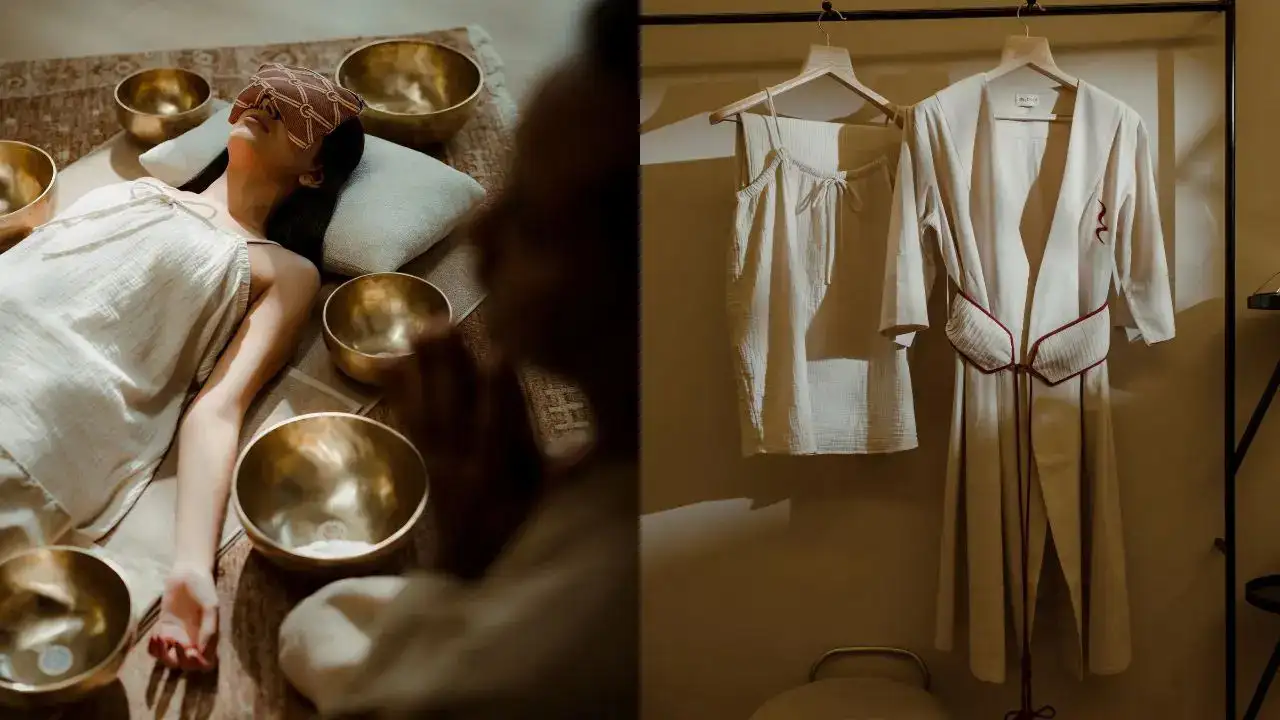By Mallika Bhagat
Copyright timesnownews

I had always wanted to join a 15-day yoga retreat in Pondicherry, but between work and family, I just couldn’t find a day off. So, instead of waiting for a vacation, I decided to pamper myself with a wellness day that went beyond your run-of-the-mill spa hours. This service included Shirodhara and Abhyanga, followed by a nice organic meal. Lying there while warm oil gently poured over my forehead, I felt all the stress and mental clutter melt away. By the time I left, my mind felt clearer and I realised that even in the middle of Delhi, it’s possible to experience wellness on a regular basis without having to check myself into a fortnight-long retreat. For decades, wellness in India was described as an ‘escape’ into nature. And is often is. You had Ayurvedic therapies in Kerala’s backwaters, yoga by the Himalayas, or naturopathy in forested sanctuaries. City life, by contrast, was quite the opposite: fast, loud, relentlessly demanding. But in the past few years, wellness is making its way into our urban spaces, and is no longer something travellers need to ‘escape’ to. It is now embedded within hotels, boutique retreats, and lifestyle studios across India’s biggest cities. The reasons are obvious to anyone living in a metro. Stress, sleep disorders, pollution and lifestyle-related illnesses have become defining features of our city lives. The pandemic years only amplified this, bringing mental health and self-care into sharper focus. In response, India’s wellness spaces are figuring out how to deliver authentic, science-backed, and culturally rooted practices to people who cannot always disappear for weeks into the hills. Urban Sanctuaries: Wellness For The City Dweller In Delhi’s frenetic heart, The Roseate has introduced the Shankara Holistic Wellness Programme. What makes it unique is that it’s designed not as a destination retreat, but as an immersive wellness experience that does not require an overnight stay. “We saw a real need, especially in busy cities like Delhi, for people to step away from daily life and not only recharge but also get to know issues within oneself through age-old Ayurvedic techniques without having to plan a full getaway,” explains Devika Sen, Director of Spa and Wellness at Roseate Hotels & Resorts. The programme, created in collaboration with the Art of Living Foundation, allows guests to consult certified Ayurvedic doctors, undergo Nadi Pariksha (pulse diagnosis), and follow personalised diet and therapy plans. Panchakarma packages, usually associated with multi-week retreats, have been adapted into five and seven-day modules that fit into city schedules. Guests can experience Shirodhara, Abhyanga and detox therapies, return home the same day, and come back for follow-ups. Crucially, Roseate has expanded beyond Ayurveda to integrate sound healing, meditation, acupuncture, and cupping therapy. “The best wellness experiences come from blending the old with the new,” Sen says. “It’s about creating something that feels both familiar and fresh, and most importantly, truly healing.” If Roseate is embedding Ayurveda into Delhi life, Shangri-La Eros New Delhi is showing how hotels can adapt to India’s wellness zeitgeist. Located in one of India’s busiest business hubs, Shangri-La has steadily reoriented its spa, dining, and guest programmes toward holistic wellness, especially through their new Wellness Club, through which they are taking care of travellers who don’t want to give up their wellness journey when on the go. “We have hydrothermal zone, for instance, which provides guests with a complete thermal journey, from the Cold Plunge Pool to the Infrared Sauna with Himalayan Salt Walls, Finnish Sauna, Steam Room, and Temperature-Controlled Whirlpool, each designed to aid recovery, circulation, and relaxation in distinct ways. The advanced recovery therapies we have are also designed to restore and rejuvenate. Guests can experience the Hypervolt Pro 2 for deep muscle relief, the Normatec 3 with dynamic air compression for enhanced warm-up and recovery, and Red-Light Therapy panels that promote healing, pain relief, improved sleep, and beauty benefits through boosted collagen and skin renewal,” shares Abhishek Sadhoo, General Manager, Shangri-La Eros New Delhi. The 4054 sq.ft. gym is another draw, with state-of-the-art Technogym equipment, Pilates Reformers, and guided personal classes. Guests can also enjoy curated wellness menus, outdoor HIIT sessions, and yoga at sunrise, creating a city-centric wellness ecosystem for both travellers and locals. “Its wellness is built into the rhythm of city life—reliable, relevant, and easy to integrate,” Sadhoo adds. Making Wellness A Lifestyle, At Your Fingertips Not all wellness travel requires hotels. Mumbai, with its relentless pace, has always lacked spaces where wellness feels both aspirational and approachable. Dhun Wellness fills that gap, creating a boutique environment that appeals especially to millennials and Gen Z professionals. Rather than occasional retreats, Dhun positions wellness as an ongoing practice, something you build into your calendar just as you would meetings or workouts. “For years, wellness meant leaving the city behind, flying to a retreat, disconnecting from daily life, and then returning to the same patterns,” explains Mira Kapoor, Founder of Dhun Wellness. “But people now want spaces where they can recharge, heal, and build preventive practices without leaving their lives on pause. That’s exactly why Dhun Wellness was created: to be a sanctuary within the city, where wellness is not a destination, but a daily alignment.” Among the most sought-after treatments are the Infrared Sauna, Red Light Collagen Bed, and BCR Microcurrent Therapy, each designed to support recovery, reduce fatigue, and enhance cellular health. Kapoor notes, “Sound healing sessions have also surprised us by drawing in people across all age groups; guests come curious but leave deeply moved by the way vibration shifts their state of being.” People are not just coming for a quick fix, but are showing up for a deeper transformation, Kapoor explains. “We recognise that time is precious, especially in Mumbai. That’s why Dhun was designed to be flexible without compromising depth. Many guests come in after work for a sound healing session, an infrared sauna, or a lymphatic massage—treatments that can be experienced in under an hour yet have profound effects. At the same time, we see those same guests returning for our longer, structured programs when they’re ready for a more immersive journey!” Wellness Rooted In India’s Heritage While boutique urban wellness centres like Dhun cater to busy professionals, retreats such as Raga Svara take a more immersive, educational approach. A family-run luxury retreat on the outskirts of Rajkot, Raga Svara positions itself as a learning institution for wellness, rather than just a temporary getaway. Mohit Patel, Co-founder and CEO, shares, “Unlike conventional retreats that may feel like temporary escapes, Raga Svara encourages guests to actively participate in their own transformation and take the practices they learn back home with them.” Sleep-focused living is a core pillar. Travellers often struggle with disrupted circadian rhythms, and Raga Svara addresses this through personalised Ayurvedic diets, therapies like Shirodhara, guidance on screen-time reduction, and a quiet, green campus conducive to rest. “Together, these elements prepare the body and mind for restorative, uninterrupted sleep,” Patel notes. Nutrition-led dining forms another key pillar. Satvik and seasonal meals, often made from ingredients grown on campus, help educate guests about sustainable, mindful eating practices, and cooking sessions help them carry a bite of these habits home. In Bengaluru, another crowded corner of India, Kshemavana Naturopathy and Yoga Center takes a more clinical approach, positioning naturopathy as a holistic system of healing rather than an indulgence. Dr. Narendra K Shetty, Chief Wellness Officer, explains the centre’s philosophy: “Naturopathy focuses on treating the root cause of disease through therapies, lifestyle changes, and detoxification, whereas a spa focuses mainly on immediate relaxation and beauty outcomes.” Programs include fasting, hydrotherapy, mud therapy, acupuncture, yoga, and lifestyle counselling, all tailored through validated diagnostic practices. The centre addresses urban issues—stress, metabolic syndrome, irregular routines—through five pillars: food, gut health, sleep, energy balance, and mind-body connection. “Urban professionals form a significant part of our guests. Our programs help them detox, manage stress, improve metabolism, and reconnect mind and body,” says Dr. Shetty. Addressing health concerns that are more urban in origin is why wellness retreats are moving closer to the cities and offering preventive, therapeutic, and educational spaces, a far cry from spa holidays of the past. The Bigger Picture: Wellness As The New Face Of TravelFor urban travellers, wellness is increasingly shaping travel choices. Hotels and city retreats are not just about sleep and room service anymore; they are integral to the experience of a city itself. International visitors often seek authentic Ayurvedic, naturopathic, and yogic experiences alongside sightseeing, while domestic professionals use city-based programs as mini-retreats that rejuvenate body and mind without leaving their routine. Whether it’s a quick after-work meditation, a structured five-day detox, or a weekend retreat in a green campus just outside the city, the focus is on creating lasting habits. As Sen from Roseate notes, “An increasing number of people are looking to make small transitions in their daily environments—for ways to feel better and live healthier lives.” Travel News – Find latest news and tips based on Indian and World travel including top 10 travel destination, tourism information, how to reach visit and more at Times Now.



